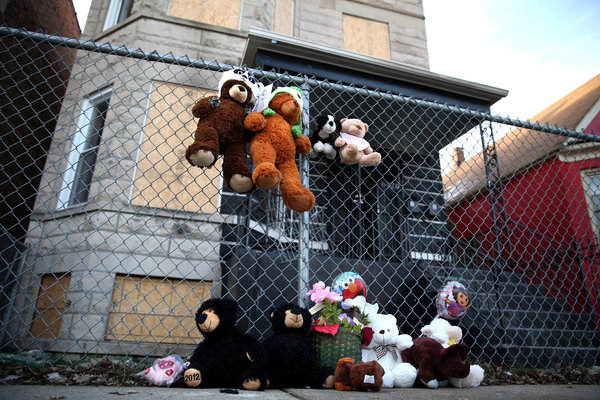
"When the fire started, everything shut off," said Darnell. "Auntie came to get us. When (she) saw the fire, she called all our names. When I opened the door, she told me, 'Come on, the fire’s getting closer.' "
Authorities said no adults were present to supervise the young children when the fire broke out.
The cause was also still under investigation, though officials said it appeared a hot plate, possibly being used to heat the room, fell onto some clothes, igniting the fire.
No adults; no smoke detectors; no gas in the building, which is why it's thought the hot plate was being used. The Sun-Times reports that the mother of the two children, facing charges of felony child endangerment, is a 23-year-old single mother of four.
It's rare that we find out much about what happened to cause such a tragedy, both the immediate cause and the long-term one. My former colleague Steve Bogira did an in-depth piece about a similar incident in West Garfield Park, though in this case the young mother was present, and saved her children before dying in the fire. It was not, Bogira writes, as unexpected a tragedy as you might think:
Hazardous attempts to warm flats that had little or no heat led to many fires in the 40s, and today many tenants here still rely principally on electric and kerosene space heaters, if not on their oven or stove. A kerosene heater apparently ignited the blaze that killed Laverne.
It was the third fire of her brief life. Lavette started the first one when the twins were two. The space heaters in the Williamses' apartment did little to keep the place warm at night, and so Glo kept the oven lit and the oven door open all night. Early one morning, Lavette crept out to the kitchen, lit a piece of paper from the oven flame, and carried it back to her bedroom. Glo woke up to the shrieks of her kids and the smell of smoke. She carried the twins and her baby from the apartment; the rest of the kids were able to run out themselves. Most of the little ones' clothes were destroyed.
Five years ago, Glo and her kids were occupying a basement apartment when a malfunctioning space heater touched off an early-morning blaze on the first floor. The Williamses escaped the building safely, but three children on the first floor died. The man living there "woke up out of a drunk," Glo says, and just ran straight out of the apartment. The three children, all younger than five, were found dead in a closet. "If I ever be in a fire again, I'm gon' know what to do," Laverne told a friend afterward.
I grew up with space heaters and kerosene heaters, and people using ovens for heat. My grandparents lived in a massive old house, and as many things as I loved about it, it does mean that one of my memories of Christmas was being cold all the time; on Christmas morning I'd run down to the kitchen, where my grandmother would open the stove up to get some heat into the drafty house. Another winter the furnace in our house stopped working, so I did all my homework sitting in the hallway with a kerosene heater aimed at me. Before bed I'd point it in the bedroom, let it run for 20 or 30 minutes, then shut it down and close the door and go to sleep before the room got cold.
As much as I've used them, they still frighten me a bit. I can't imagine, though, using a hot plate as a heat source.
The fire that Bogira writes about began with a kerosene stove (the house had gas, but like my grandparents' house, it wasn't sufficient to keep the house warm), but the precise cause was never determined. The proximate cause, however, was poverty, which is where the piece truly gets deep and textured, and where it reminds me of Saturday's fire:
Considering what a burden it can be, why do girls here get pregnant so early? That's a question Lavette–and Denise, and Dovie, Rhonda, and Linda–say they can't really answer.
Some do it because they're envious of other girls who have babies, Lavette says. And some really have babies just to get on welfare or to fatten their aid checks, according to Dovie.
But why did they themselves get pregnant in their early teens? That question elicits mainly shrugs. "I wasn't tryin' to get pregnant, just happened," Lavette says. "I was just doin' somethin' I had no business to," Dovie says. Their first pregnancies resulted from ignorance about birth control, they say, later pregnancies from failed attempts to use contraceptives. (Denise, Dovie, and Lavette got headaches and nausea from birth control pills, and so mostly used less reliable contraceptives. Laverne, too, used to say the pill made her sick, but Glo didn't buy that; Laverne just didn't like taking pills, Glo says. "I used to say to Laverne 'You take your pill?' 'Yeah, I took my pill.' When she go to school, I go and check behind–she don't be takin' nothin'. Sometimes she'd hold it on her tongue, wait 'til she go outside, and spit it out.")
And when it's not mysterious, it can be simply self-perpetuating:
Males are, indeed, in the driver's seat in male-female relationships here, catered to for traditional sexist reasons but also probably because of demographics: males are in short supply in slums like Garfield Park, many of them gone to cemeteries and prisons. Young girls are left to compete for the remaining ones, to bicker and fight over them and allow them to "get over" early and often.
The piece, "A Fire in the Family," is well worth your time, an in-depth look at an easily passed-over tragedy.
Photograph: Chicago Tribune


